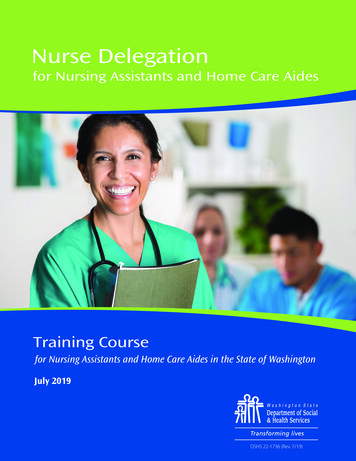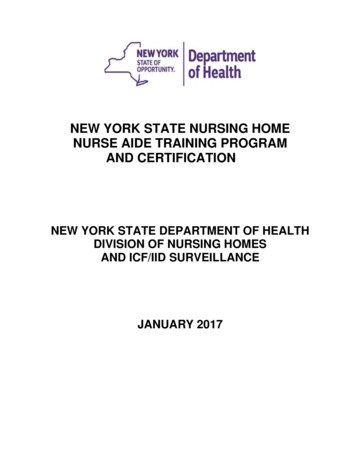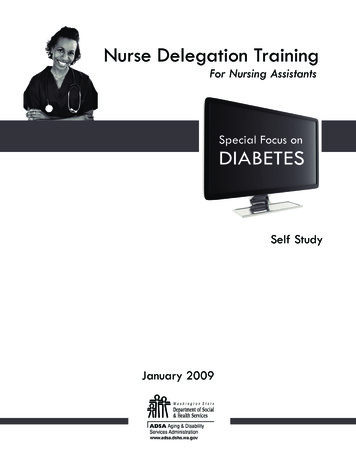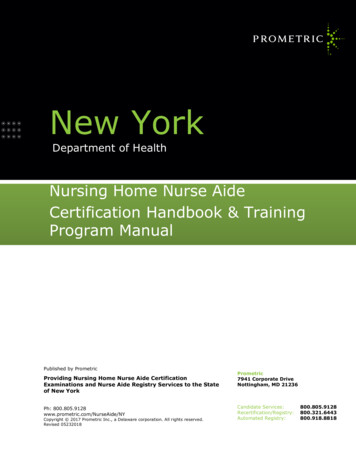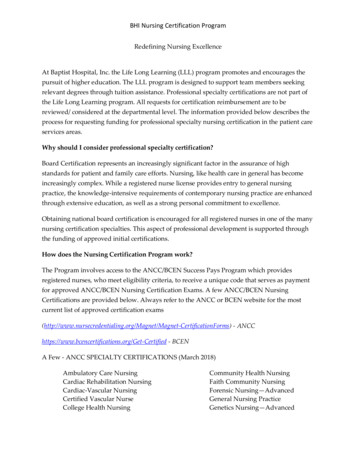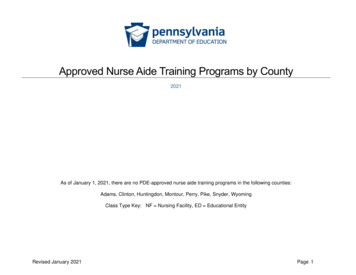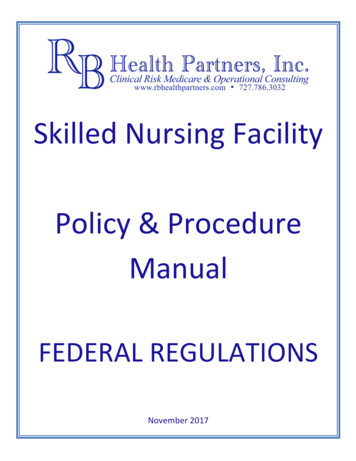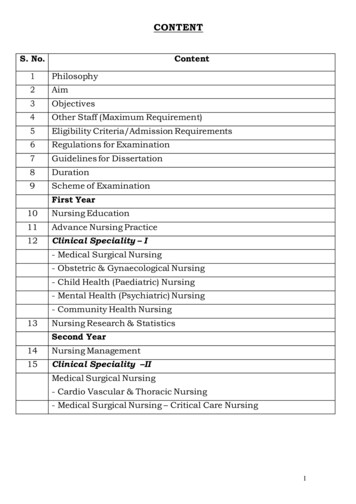
Transcription
Nurse Delegation for Nursing AssistantsSelf-Study Training CourseFor Nursing Assistants in the State of WashingtonDecember 2008
This Workbook and video self-study project is a joint effort of ResidentialCare Services and Home & Community Services, Aging and DisabilityServices Administration, Washington State Department of Social and HealthServices (DSHS).We want to thank the following individuals and agencies for their help:Jo Lynn Abernathy, Madeline Alexander, Elaine Blum R.N.D., Bonnie BrianCaldwell, Nancy Carter M.D., Colleen Erskine, Karen Fogarty R.N., TerryGammage R.N., Saif Hakim, Joe Honda, Agnes Hubble R.N., Jacquie Luck,Paula Meyer R.N., Leann Riley, Catherine Rucker, Alice Santolla R.N.Adult Family Homes of Washington StateMedicine Shoppe PharmacyRochester Retirement ChaletDivision of Developmental Disabilities, DSHSNOR ALFAWest Woods Assisted LivingSouth Puget Sound Community CollegeWashington Association of Homes and Services for the AgingWashington State Department of HealthWashington State Nursing Care Quality Assurance commissionWashington State Pharmacy BoardWashington State Residential Care CouncilThe many other reviewers who contributed to this Workbook and videoproject.
Nurse Delegation for Nursing AssistantsTable of ContentsGetting StartedIntroduction .1Introduction and Course Goals . 1Completion Requirements . 2Lesson Outline & Preview. 3Lesson Process. 5Lesson Markers or Icons. 6Tips for Success. 7Nurse Delegation Law & Your Role in Delegation .8Lesson Outline & Preview. 8What is Nurse Delegation . 9The Five Conditions in Nurse Delegation . 9Roles and Responsibilities: The Client. 15Roles and Responsibilities: The Delegating RN . 15Roles and Responsibilities: The Nursing Assistant . 17Roles and Responsibilities: The Case Manager. 18Roles and Responsibilities: Agency Supervisor . 19Roles and Responsibilities: The Employer/Administrator . 19Nurse Delegation Communications Checklist. 21Lesson Summary . 22Practice Exercise . 25Practice Exercise Answer Key . 27Client Care and the Body Systems .29Lesson Outline & Preview. 29Client Profile . 30Major Body Systems . 32Cardiovascular System . 33Respiratory System. 35Integumentary System . 36Care of Skin . 37Pressure Ulcers . 39Skin Breakdown . 41Genito-urinary System . 43Gastrointestinal System . 45Endocrine System . 47Additional Information Diabetes . 48Nervous System. 51Musculoskeletal System . 53Sensory System . 55Lesson Review . 56Practice Exercise . 59Practice Exercise Answer Key . 61
Lesson 3Medication Administration . 65Lesson Outline & Preview .65Fundamentals of Medication .66Routes of Medication Administration .70Medication Packaging and Labeling .72Medication Assistance & Medication Administration .73Five Rights of Medication Administration .74Medication Administration Process .75What to Do When Special Situations Arise .78Storage and Disposal of Medications .80Lesson Summary .81Practice Exercise .85Practice Exercise Key .87Lesson 4Treatments . 89Lesson Outline & Preview .89Ear Drops .90Eye Drops or Ointments .92Nasal Drops or Sprays .94Oral Inhalation Therapy .96Rectal Suppository or Cream .98Vaginal Suppository or Cream .100Non-sterile Dressing Changes .102Glucometer Testing .104Gastrostomy Feedings .105Ostomy Care .109Straight Clean Urinary Catheterization .111Practice ExamPractice Course Exam Overview .113Practice Course Exam .114Practice Course Exam Answer Key .119Glossary of Terms . 123Job Aids . 132Nurse Delegation Communications ChecklistMedical AbbreviationsAdministering Ear DropsAdministering Eye Drops or OintmentsAdministering Nasal Drops or SpraysAdministering Oral Inhalation TherapyAdministering a Rectal Suppository or CreamAdministering a Vaginal Suppository or CreamNon-sterile Dressing ChangeGlucometer TestingGastrostomy FeedingsOstomy CareStraight Clean Urinary Catheterization
Getting StartedWelcome to Nurse Delegation for Nursing Assistants: Self-Study Course.This course is designed to help prepare you to accept nurse-delegated tasks.Your training happens in two steps. You will: Introductionand CourseGoalsLearn the basics of delegation, how to administer medication, andhow to perform some specific health care procedures from thisself-study.Receive on the job training from the delegating Registered Nurse(RN), on the specifics of how to care for an individual client.Self-Study Course GoalsThis course will teach you: What the law requires for Nurse Delegation. Your role as a Nursing Assistant in the delegation process. The importance of your role in client care as a partner with thedelegating RN.The basics of how to administer medication.Medical knowledge you will need to perform specific proceduresor treatments.Characteristics you will need to provide effective client care.On the Job Training with the Delegating RNYou will receive specific instructions for delegation from the delegatingRN for each individual client. The RN will teach you vital informationabout each client, the specific tasks being delegated, and exactly how toperform each activity.The training you receive from the delegating RN is the most important partof this process. This instruction will occur each time you receive adelegated task from the RN. The RN also evaluates your competency toperform the delegated task.This Nurse Delegation for Nursing Assistants: Self-Study Course is forWashington State caregivers who: Who Must TakeThis Course?Work in, or will work in, community-based long-term caresettings, as defined on page 14.Are current Nursing Assistants-Registered (NA-Rs) or NursingAssistants-Certified (NA-Cs) or will be getting this certificationbefore accepting delegated tasks.Will accept and perform tasks delegated by a delegating RN.Getting StartedAging and Disability Services Administration1
Materials Providedto YouBefore starting the training, please make sure you have the followingmaterials. When you signed up for the course, you should have received aworkbook and training video or DVD.Student WorkbookThe Student Workbook is yours to keep. It contains: Training Lessons 1 through 4 Practice Examination (Lesson 5) Glossary of Terms Job Aids and ChecklistsTraining Video/DVDThe training video/DVD is a companion to the workbook. It providesmore information, illustrations, and demonstrations of concepts covered inthe lessons.Materials andResources YouShould SupplySuccessfullyCompleting thisSelf-StudyCourseIn addition, you will need: A quiet place to work, without being interrupted Television and VCR or DVD player Pencil or pen, and a highlighter Blank paper (for your notes and questions)Completing a self-study course is different than being in a classroom withan instructor. This section helps you get ready to complete the coursesuccessfully. Please read this whole section before you begin the rest ofthe course.To successfully complete this course, you will need to do the followingafter you have finished this self-study course: Pass the course examination with a score of 80% or better. Turn in your Student Evaluation to the Training Coordinator. Return the video/DVD to the Training Coordinator. Present your Workbook, with the practice exercises completed, forreview by the Training Coordinator.The lessons are designed to ensure you are fully prepared to pass thecourse examination. If you work through each lesson, answer the practicequestions, and complete the Practice Examination in Lesson 5, you will beready for the Course Examination.2Getting StartedAging and Disability Services Administration
Lesson OrganizationLesson OutlineThis self-study course is divided into five lessons:Lesson 1 – Nurse Delegation Law and Your Role in DelegationLesson 2 – Client Care and the Body SystemsLesson 3 – Administering MedicationLesson 4 – TreatmentsLesson 5 – Course Summary and Practice ExamNurse Delegation Law and Your Role in DelegationThis lesson outlines all of the basics of Nurse Delegation and answers thecore “who, what, where, when, why, and how” questions for you. You’lllearn: What is nurse delegation and who is involved? Why is nurse delegation used? Where can delegation happen? Who can delegate a task to me and who cannot delegate to me? When can I accept a delegated task? What kinds of tasks can be delegated to me? What cannot be delegated to me? What is my role and what I am responsible for? How does the delegation process happen?Client Care and the Body SystemsIn this lesson, we will address your relationship with your clients. We willdiscuss the typical client profile to help you prepare for some of thecircumstances you may encounter.Lesson 1PreviewLesson 2PreviewYou will learn about the major systems in the body, the effects of agingthat can occur, and some of the common diseases. This information will bethe foundation we will build on when we discuss MedicationAdministration in Lesson 3 and Treatments in Lesson 4.This background knowledge should help you confidently performdelegated tasks and provide a higher level of overall care to your clients.Getting StartedAging and Disability Services Administration3
Lesson 3PreviewMedication AdministrationThis lesson recaps the module from Revised Fundamentals of Caregivingthat covers medication assistance and medication administration. You willbuild on those concepts and learn the requirements for accepting adelegation for medication administration.You have a very important role when administering medication to clients.You will be the key person to watch for side effects and to take action earlyif you see side effects occurring. You will also need to know what to do ifyour client will not take a medication or if you discover an error.Lesson 4PreviewTreatmentsIn this lesson, you will learn the recommended ways to perform the morecommon treatments that may be delegated to you, such as non-steriledressing changes, glucometer testing, and gastrostomy feeding.You have a very important role in identifying complications that can occurfrom different diseases and communicating the condition of your clients tothe delegating RN.Lesson 5PreviewPractice ExaminationIn the final lesson, you will review everything from the course and preparefor your Final Course Examination. You will take a practice examination tobecome familiar with the test format and topics.Once you have completed the practice exam, you will be well prepared tosuccessfully complete the Final Course Examination4Getting StartedAging and Disability Services Administration
Lesson ProcessYou will use the Instructional Video/DVD and the Workbook together foreach lesson. For each lesson, you will: Read the Lesson in the Student Workbook. The Workbook will: Present the goals for the lesson. Present the topic, explain the concepts, and give examples. Summarize what you have learned. Answer some commonly asked questions.Review examples of possible test questions that you might see on thefinal exam. Watch the Lesson on the video or DVD. The Video/DVD will: Review what you have learned in the Workbook. Demonstrate the procedures. Discuss issues that will come up when you apply what youhave learned on the job, and show you what to watch for.Present situations that may come up on the job and discussthe best way to handle them.Review the Lesson in the Workbook.If you have questions after watching the video/DVD, you can goback and review that section in the Workbook. You can also make anote of the question to ask the instructor.The video/DVD segments are a very important part of this training. Youwill observe a Nursing Assistant and a delegating RN talking togetherabout common issues you will face on the job. These interactions shouldhelp you think about questions you will want to ask your delegating RN.NarratorsGetting StartedAging and Disability Services Administration5
Markers orIconsBoth the Workbook and the Video/DVD use markers or icons to help youmove through the training easily. Here is a list of the markers used.MarkerMeaningStopStop reading the Workbook or watching theVideo at this point.WorkbookRead the next section in the Workbook.Video/DVDWatch the next section in the video/DVD.Required by LawThis content is taken directly from the statutesor laws pertaining to Nurse Delegation.ProcedureA step-by-step process you will follow tocomplete a specific activity. Many procedureswill be included as checklists you can use backon the job to help you.Tip for SuccessA recommendation to make a process easier or togive better client care.Ask for HelpThis is a topic or issue that you should discusswith the delegating RN.Key WordWhen new words that you should remember areused for the first time, they will be defined foryou. Key Words are also in the Glossary.ReportWhen you need to report something to thedelegating RN, your supervisor, or the client’sdoctor.6Getting StartedAging and Disability Services Administration
Read the Workbook section first and then watch the video/DVD ofthe same section. If you still have questions after watching thevideo/DVD, go back and review that section in the Workbook untilyou understand.Tips for SuccessIf you come to a word that you don’t understand, look in theGlossary in the back of the Workbook.You can stop and rewind the video/DVD to review anything youdon’t understand.Schedule time to complete each lesson when you will have the leastnumber of interruptions.As you move through each lesson, take notes in the Workbook andhighlight key concepts. This will help you remember more of theinformation.Write down any questions that you have after each lesson.If your questions are not answered in the Workbook or on thevideo/DVD, ask the Training Coordinator.Stop reading the Workbook here.Watch the Video/DVD Segment for Getting Started.Getting StartedAging and Disability Services Administration7
Page85
Lesson 1 – Nurse Delegation Law & Your Role in DelegationOverviewNurse Delegation Law and Your Role in DelegationPreviewThis lesson outlines all of the basics of Nurse Delegation, answering thecore who, what, where, when, why, and how questions for you. You’lllearn: What is Nurse Delegation and who is involved? Where can delegation happen? Who can delegate a task to me, and who cannot delegate to me? When can I accept a delegated task? What kinds of tasks are delegated to nursing assistants? What cannot be delegated to me? What is my role and what am I responsible for? Why is nurse delegation used? How does the delegation process happen?LearningObjectivesOnce you complete this lesson you will be able to: Define nurse delegation.List the specific places where you can work and receive nursedelegation under the law.List the specific tasks that cannot be delegated to you under thelaw.Describe what you need to do to be qualified to accept a delegatedtask.Explain who is involved in nurse delegation and what eachperson’s role is in the process. Describe your rights and responsibilities in delegation. Determine the communication process to use where you work. Describe the attributes of an effective nursing assistant.Nurse Delegation Law and Your Role in DelegationAging and Disability Services Administration8
Defining Delegation: Five Conditions for Nurse DelegationWhat DoesDelegation Mean?Delegation means giving or transferring a responsibility or task to somebody else.What is NurseDelegation?Nurse Delegation means a licensed Registered Nurse (RN) transfers theperformance of a specific task for an individual client to a qualifiedNursing Assistant working in community settings.The licensed RN who delegates the task is responsible and accountable forthe nursing care of the client.Accepting a delegated task means you: Are willing to perform a specific action to care for a client in placeof the RN.Have been given clear and specific instruction from the delegatingRN on what to do and when to do it.Believe you can perform the task correctly and safely.Revised Code of Washington (RCW) 18.88A.210, RCW 18.88A.230 andRCW 18.79.260 (the law).Washington Administrative Code (WAC) 246-840-910 through246-840-970, WAC 246-841-405 (the rules).The FiveConditionsThere are five conditions of nurse delegation:1. A licensed Registered Nurse transfers the performance of a task.2. The task can be delegated. There are three specific tasks that may notbe delegated.3. A delegation must be for a specific task for one client.4. Only qualified Nursing Assistants can accept delegation.5. Delegation can only happen in four community settings.Each of these parts of the delegation must be in place for the delegation tobe in accordance with the law.9Nurse Delegation Law and Your Role in DelegationAging and Disability Services Administration
Condition 1 – Licensed Registered Nurse (RN)Only a RN licensed in Washington State, who is the RN responsible forthe client you are working with, can delegate a task to you.Condition 1Who Can Delegate?So, who cannot delegate a task to you? The facility administrator, if not the delegating RN Your supervisor or lead, if not the delegating RN A Licensed Practical Nurse (LPN) A Home Health Care Nurse, if not the delegating RN Another RN who does not assume formal delegation responsibilityfor the clientCondition 2 – Specific TasksThe following are examples of the types of tasks that can be delegated toyou: Administration of medications. Non-sterile dressing changes. Urinary catheterization using clean technique. Ostomy care in established and healed condition. Blood glucose monitoring. Gastrostomy feedings in established and healed condition.Condition 2What Can BeDelegated?We will discuss each of the tasks above in more detail in later lessons inthis course. For definitions of terms, please see the Glossary.The following tasks cannot be delegated to you: Injections, other than insulin Sterile procedures Maintenance of central linesWhat CannotBe Delegatedto Me?In addition, tasks that require nursing judgment should not be delegated toyou.Nurse Delegation Law and Your Role in DelegationAging and Disability Services Administration10
Condition 3What is the Scopeof the Delegation?Condition 3 – A Specific Task for One ClientDelegation is limited to the specific task for one client only. This is bestexplained by an example. Let’s say that the RN delegates theadministration of ear drops for Mary Jones to you. This delegation coversthe administration of ear drops only, for one client, Mary Jones.Specific task - Mary also needs dressing changes for a pressure sore onher leg. Even though you are responsible for Mary’s ear drops, you are notallowed to do the dressing changes, until the delegating RN does a separatedelegation, with complete instructions on dressing changes for Mary.One client – Arthur Rodriguez is another of your clients. He also requiresthe same ear drops that you administer to Mary Jones. Even though youare responsible for Mary’s ear drops, you are not allowed to administerArthur’s ear drops. You would be responsible for administering Arthur’sear drops only if the RN delegates that task to you with completeinstructions for Arthur’s care.Condition 4When Can I Accepta Delegated Task?Condition 4 – Qualified Nursing AssistantIt is very important to understand when you can accept a delegated task.There are four requirements you must complete before you accept adelegated task. You must:1. Be a Nursing Assistant Registered (NA-R) or a Nursing AssistantCertified (NA-C) in the Washington State.2. Have completed the education requirements for delegation.3. Be willing to perform the specific task to be delegated.4. Demonstrate to the delegating RN your competence to correctlyperform the specific task without direct supervision.11Nurse Delegation Law and Your Role in DelegationAging and Disability Services Administration
To become a Nursing Assistant Registered (NA-R), you must havecompleted the Department of Health’s HIV/AIDS training.* Once youhave taken the HIV/AIDS training, complete an Application forRegistration as a Nursing Assistant (DOH 667-025[Rev. 2/08]) and mailit with a 30.00 application fee and your HIV/AIDS certificate to:Condition 4Part 1:NA DesignationsNA-RWashington State Nursing CommissionP. O. Box 1099Olympia, WA 98507-1099*Proof of HIV/AIDS training from the Revised Fundamentals ofCaregiving course will fulfill the requirement for the HIV/AIDScertificate.To apply to become a Nursing Assistant Certified (NA-C), you mustcomplete a training program approved by the Washington State NursingCare Quality Assurance Commission and successfully pass the OBRAexamination for certification.Condition 4Part 1:NA DesignationsNA-CSend the Training Program Certification, Application for Certificationas a Nursing Assistant (DOH 667-029 [Rev. 5/08]), and 30.00application fee to:Washington State Nursing CommissionP. O. Box 1099Olympia, WA 98507-1099If your name is listed on another state registry, you may qualify forInterstate Endorsement as a Nursing Assistant Certified. Send acompleted Application for Certification as a Nursing Assistant byInterstate Endorsement (DOH 667-029 [Rev. 5/08]), 30.00 fee, andverification that you are on another state’s registry to the address above.Nursing Assistants are responsible for renewing their certificationor registration annually.Before you can perform a delegated task, you must complete theeducation requirements as listed on page 13.For caregivers working in DDD certified Supported Living Services, nursedelegation can only occur after DDD core training and required in-servicetraining is completed. Staff working in DDD certified supported livingservices do not need to take basic training.Condition 4Part 2:EducationRequirementsNurse Delegation Law and Your Role in DelegationAging and Disability Services Administration12
Condition 4Part 2:EducationRequirements(continued)If you are a You must have successfully completed NA-RBasic Training (Revised Fundamentals ofCaregiving or other DSHS approved basictraining) ANDNurse Delegation for Nursing Assistants *NA-R—Working for aSupported Living AgencyDD basic training (32-hour, not transferable fromone agency to another) ANDNurse Delegation for Nursing Assistants *NA-R—Previous fosterparent for a client nowreceiving nurse delegationPRIDE training (43-hour) (not transferable toanother delegation client ANDNA-CNurse Delegation for Nursing Assistants *Nurse Delegation for Nursing Assistants ** If you will be delegated the task of insulin injections, you must alsosuccessfully complete the Nurse Delegation for Nursing Assistants: SpecialFocus on Diabetes training.DocumentsYou should be prepared to demonstrate to the delegating RN that you havecompleted the requirements above. You should be ready to present to thedelegating RN: Your NA-C certification or NA-R registration document from theDepartment of Health.Your Revised Fundamentals of Caregiving Training Certificate ofCompletion (NA-R only) OR DDD core training certificate.Your Nurse Delegation for Nursing Assistants training Certificateof Completion.You will receive your Nurse Delegation training Certificate of Completionafter you pass the final examination. See page 113 for more information.Condition 4Part 3:Willingness toPerformWillingness to PerformThe third requirement of Condition 4 is that you are willing to perform thedelegated task.If you do not feel competent to perform the task or you believe that clientsafety is at risk, you should not perform the task. Instead, communicateyour concerns to the delegating RN, the case manager, and/or youremployer or supervisor. No one can force you to perform a task that youdo not believe you are competent to perform.13Nurse Delegation Law and Your Role in DelegationAging and Disability Services Administration
If you work in a facility, be sure to address the nurse delegation processand the requirements that relate to your position at the time ofemployment. Generally, when you accept a nursing assistant position thatincludes delegation, you are indicating that you are willing to performdelegated tasks as part of your job responsibilities.Skills to PerformThe final part of Condition 4 is that you must have the skills to performthe delegated task. Before delegating a task to you, the RN must make surethat you can perform the task on your own without help.Condition 4Part 4:Skills toPerformFor each delegation task, the RN will give you specific, writteninstructions on how to perform the task. The RN will then train you on thejob, show you how to perform the task, and ensure that you can do it.The RN will only delegate a task to you when he or she is satisfied that youcan correctly and safely perform the task.Condition 5
Your role as a Nursing Assistant in the delegation process. The importance of your role in client care as a partner with the delegating RN. The basics of how to administer medication. Medical knowledge you will need to perform specific procedures or treatments. Charac

